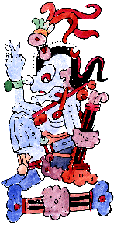The ancient Maya had a complex pantheon of deities whom they worshipped and offered human sacrifices. Rulers were believed to be descendants of the Mayan gods and their blood was the ideal sacrifice, either through personal bloodletting or the sacrifice of captives of royal blood.
The Maya vision of the universe is divided into multiple levels, above and below earth, positioned within the four directions of north, south, east and west. After death, the soul was believed to go to the Underworld, Xibalba (shee bal bah), a place of fright where sinister gods tested and tricked their unfortunate visitors.
As with all Myths about Mayan Gods and Goddesses - Mayan Myths discuss connections with being from other realms who came to Earth to seed the planet.
Many people see the story of the Popol Vuh is the story of extraterrestrial Gods who came down and made man in his own image. When they first made man he was so perfect - living as long as they did - he could see far and wide - clairvoyant - and was as perceptive as they were.
They realized that they had made a competitor who was as wise as the Gods themselves. So they destroyed him and started over creating present day man. Modern man lives shorter lifetimes, is not as smart, and is here to act as a servant race to the Gods.
Within their culture they have legends of visiting Gods from outer space. In the last thousand years the being known as Quatzequatl the Great Feathered Serpent was a God who brought the teaching of peace to this part of the world and appeared as a white God with a beard. The drawings of him look almost identical to the drawings of the being known as Ea or Enki in the ancient Sumerian teachings.
In fact they looked like the images we see of Reptilians.
Quatzequatel: Winged God
Mayan god Thoth and Quetzacotal were the same person, Thoth was identified to Atlantis, Egypt, Sumer, then later was identified to Meso America and Peru as Quetzacoatal.
2
3
The wind god was also known as the feathered-serpent god Kukulcan.
At Uxmal, all buildings are aligned in the same direction. Surprisingly, Mayans knew the motions of Venus with much accuracy.
Venus, the morning star, was the patron planet of warfare. Many offerings were made to Venus and the Sun.We know from a historian that people would stop up their chimneys so that no light from Venus could enter their houses and cause harm.
Ix Chel was depicted as an old woman wearing a skirt with crossed bones, and she had a serpent in her hand. She had an assistant sky serpent, whom they believed carried all of the waters of the heavens in its belly. She is often shown carrying a great jug filled with water, which she overturns to send floods and powerful rainstorms to Earth.
Her husband was the benevolent moon god Itzamna. Ix Chel had a kinder side and was worshipped as the protector of weavers and women in childbirth.
Ah Kinchil: the Sun god.
Ah Puch: the god of Death.
Ahau Chamahez: one of two gods of Medicine.
Ahmakiq: a god of Agriculture who locks up the wind when it threatens to destroy the crops.
Scource http://www.lost-civilizations.net/mayan-gods.html




















